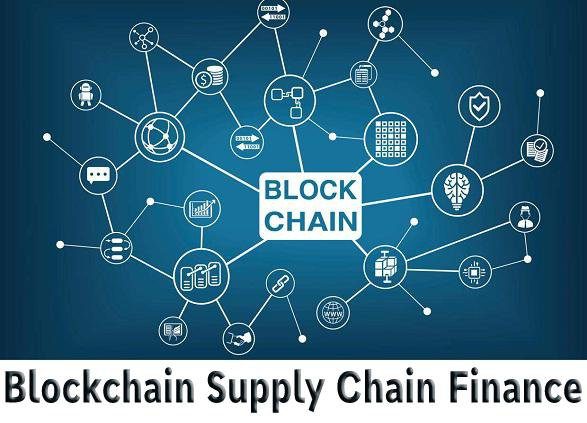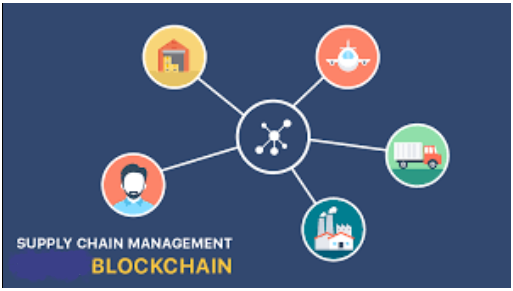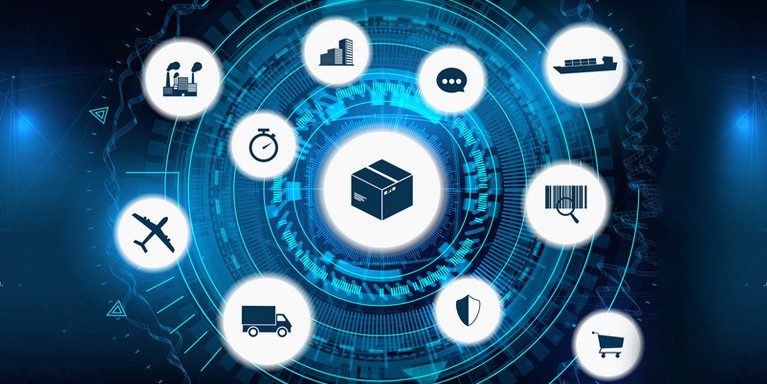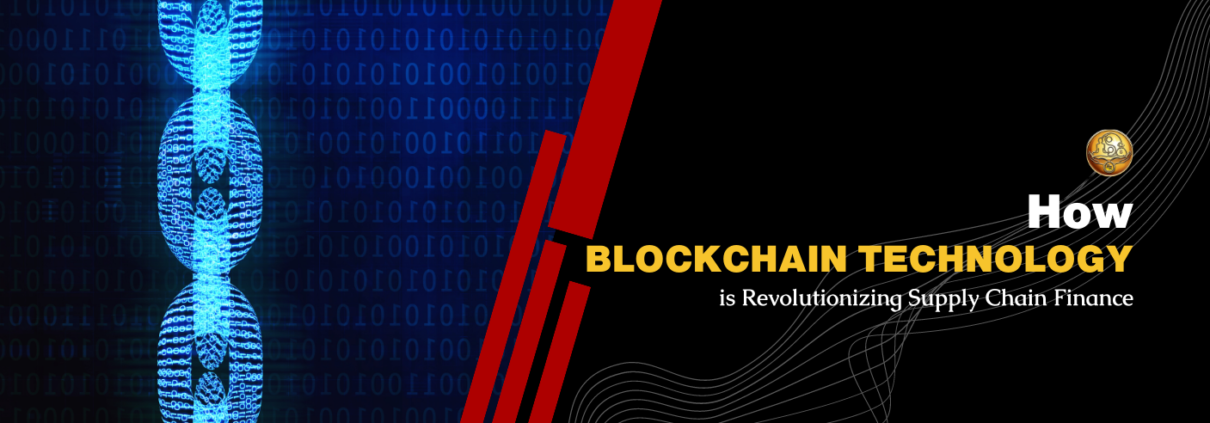In recent years, blockchain technology has been getting a lot of attention because it has the ability to change many different industries. Supply chain management is one area where blockchain has the ability to make a big difference.
At its core, blockchain is a decentralized, distributed ledger that makes it possible to make deals that are both safe and clear without the need for middlemen. In other words, it keeps a permanent record of all events that can’t be changed and that anyone with access to the network can look at and check.

This can be helpful in many ways for managing the supply line. For example, it can make supply chain operations more clear, cut down on fraud and fakes, and make it easier to track goods from their source to their final destination.
In this blog post, we’ll talk about how blockchain technology could be used in supply chain management and the benefits it could bring to companies that work in this area.
Blockchain’s Role in Supply Chain Management
Definitely! There have been problems in the supply chain management business, such as a lack of transparency, security problems, and inefficiency. But now that blockchain technology is here, there is a chance to change the way functions are managed throughout the system.

Here are the benefits of blockchain for managing the supply chain.
(a) Better Tracking
Blockchain creates a record of transactions that can’t be changed or tampered with. This makes it easier to watch how goods move through the supply chain. It helps make things more open and accountable and lowers the risk of scams and fake goods.
(b) Increased Efficiency
By giving all parties in the supply chain a single transaction, blockchain can help to speed up operations and cut down on mistakes and delays. It makes the process go faster and work better, saving money and making customers happier.
(c)Better Security
Blockchain uses advanced cryptography to protect the security and privacy of data, making it less likely that data will be stolen or used in a hack. This helps keep private information, like trade secrets, safe and protects the supply chain’s integrity.
(d) Trust has Grown
Blockchain makes it easier for people in the supply chain to trust each other because it keeps a clear and auditable record of all interactions. As a result, it cuts down on disagreements and makes it easier for people to work together. This makes ties between suppliers, manufacturers, and customers stronger.
(e) Better Customer Satisfaction
Blockchain also helps improve customer satisfaction by making the supply chain more open and clear. It cuts down on delays and mistakes and improves the quality of the result.
(f) Better Data Analytics
Because blockchain provides a single, standard source of data for the whole supply chain, it makes data analytics better and gives insights into how the supply chain is doing. Businesses can find ways to improve and make their supply chain processes run as smoothly as possible.
How Blockchain Will be Used in the Future in Supply Chain Management
Blockchain technology will continue to change and improve as time goes on. The more people use blockchain, the more processes will be standardized. New blockchain-based supply chain systems will pop up, and more attention will be paid to sustainability.

Here are some ideas about how technology will keep changing supply chain management in the future.
- Increased Adoption: More enterprises will utilize blockchain technology for supply chain management as they discover its benefits. More users will standardize procedures and improve supply chain transparency and efficiency.
- New Platforms: As this technology grows, there is a chance that new blockchain-based supply chain platforms will appear. These tools will give businesses more advanced ways to integrate.
- More focus on sustainability: A blockchain-based system for managing the supply chain. Can do a lot to encourage sustainable practices. In the future, we can expect companies to put more emphasis on sustainability. And use blockchain technology to cut down on waste, improve efficiency, and reduce the damage. Supply chain operations do to the environment.
- Use of smart contracts: Smart contracts are agreements that automatically go into effect. Because the terms of the deal are written straight into code. As the use of blockchain technology in supply chain management grows, smart contracts will be used. More and more to simplify and speed up processes.
- Integration with advanced technology: As other new technologies. The Internet of Things (IoT) and artificial intelligence (AI), grow quickly. We can expect to see these technologies combined with blockchain technology in supply chain management. It can lead to more changes in the way work is done.
Examples of Blockchain in Supply Chain Management from the Real World:
Blockchain technology is used in many different fields because it is safe and open. Check out these examples of how blockchain is used in supply chain management in the real world:
(a) Nestle: Nestle is the largest food and drink company in the world. It uses this technology to find out where the ingredients in its goods come from. It lets Nestle track every part of the supply chain, from the farm to the plant. This makes Nestle more open and honest.
b) Walmart: Walmart is one of the biggest stories in the world, and it has put in place a blockchain-based system to track the supply line of its fresh food. It lets Walmart know where each item they make came from and when and where each step in the supply chain happened. It also lets buyers know what’s going on and helps cut down on food waste.
c) Unilever: In order to make it easier to track palm oil, Unilever has added blockchain to its supply chain. Its goal is to promote sustainability by making information about the product and how to make it easy to find.
d) Maersk: TradeLens is a blockchain-based tool that was made by Maersk and IBM. Maersk is the largest container shipping company in the world. The platform helps to streamline the global shipping industry by giving a safe and clear way. To watch goods as they move through the supply chain, from the factory to the port to their end destination.
Five Ways in Which Blockchain is Revolutionizing Supply Chain Management
Blockchain technology is revolutionizing the supply chain business in many different ways. Here are five of the most important ways that blockchain is changing how supply chain management is done:

- Enhanced Transparency and Traceability with Blockchain in Supply Chains
Blockchain revolutionizes supply chains by enhancing transparency and traceability. Every transaction and event is securely recorded, reducing fraud and improving accountability. Walmart’s collaboration with IBM showcases this through a blockchain-based system tracking food supplies. Transparency ensures consumer safety and informed decision-making. With blockchain, supply chains gain integrity, efficiency, and customer satisfaction.
2. Streamlined Inventory Management with Blockchain
Blockchain revolutionizes inventory management by providing real-time visibility and precise tracking. Through IoT integration, supply chain participants receive instant updates on inventory levels, storage conditions, and delivery status. This reduces stockouts, overstocks, and waste. Maersk and IBM’s TradeLens is a prime example, offering real-time visibility and digitizing shipping documentation. Blockchain-powered inventory management ensures efficiency, optimized inventory, and proactive decision-making. Embrace blockchain for streamlined inventory management and transform your supply chain operations.
3. Safe and Effective Management of Suppliers
Blockchain technology has made it easy and safe to handle suppliers. Smart contracts are self-executing contracts that are saved on the blockchain. They can be used to automate adding a new supplier, verifying a supplier, and settling payments. Smart contracts get rid of the need for agents, cut down on administrative costs, and make it easier for customers and suppliers to trust each other.
The Chinese e-commerce giant Alibaba came up with the Food Trust Framework, a blockchain-based system that aims to improve food safety and supply chain openness. The technology lets food products be tracked from where they are made to where they end up. This makes sure that suppliers follow the law and that customers can get true information about the goods they buy.
4. Preventing Counterfeit Goods Across the Supply Chain with Blockchain Technology
Blockchain is revolutionizing the fight against counterfeit goods. By creating a transparent digital trail. And verifying product authenticity, blockchain thwarts attempt to alter or fabricate information. This ensures customers receive genuine products and protects the brand’s reputation. LVMH’s collaboration with ConsenSys and Microsoft on AURA exemplifies this. Blockchain’s effectiveness in combating counterfeit luxury goods. With blockchain, supply chains gain transparency and trust. Businesses to protect customers and maintain integrity.
5. Improved Supply Chain Financing
Better Supply Chain Financing Blockchain technology can be used. To improve and speed up supply chain financing procedures. By digitizing information about the supply chain, like buy orders, invoices, and shipping information. Blockchain gives lenders access to transaction data in real-time. This openness helps the cash flow of the whole supply chain. Because it makes it easier for suppliers to get working capital and reduces the risk for lenders.
The Singapore-based trade finance company Dltledgers uses blockchain technology. To make supply chain financing easier. By digitizing trade papers and automating procedures. With smart contracts, the technology makes sure that suppliers can get safe and effective financing. Because of this, cash flow speeds up, financing costs go down, and businesses can get operating capital more easily.
Conclusion
Blockchain technology revolutionizes supply chain finance with transparency, security, and efficiency. It verifies transactions, reduces fraud, and provides real-time visibility. Smart contracts automate processes and make finance accessible. Initiatives like AURA protect luxury brands. As blockchain advances, interoperability and decentralized finance offer more opportunities. Embrace blockchain for resilient supply chains and competitive advantages.
Editor’s Choice:
Investment Strategies for Doctors: Securing Long-Term Financial Stability
Unleashing the Network Effect: Powering Business Growth through Strategic Networking
Maximizing Tax Savings: 14 Essential Tax Deductions for Doctors





Leave a Reply
Want to join the discussion?Feel free to contribute!